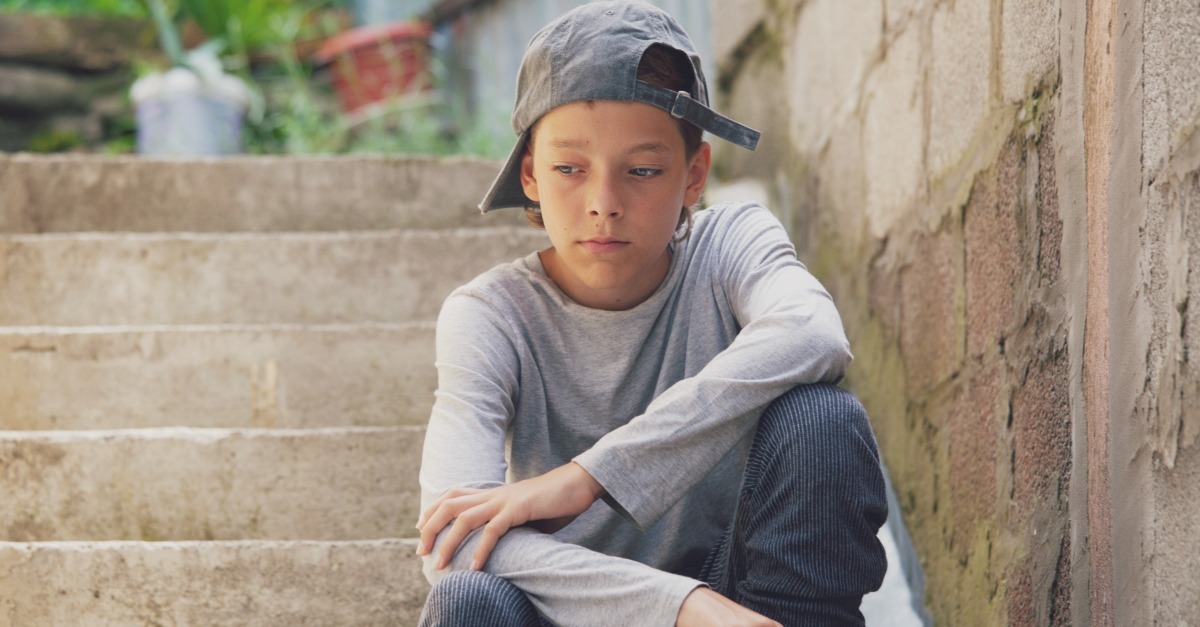There is so much going on physically and emotionally with teenagers, it can be difficult to know if your child is just managing normal adolescent development, or dealing with a mental health issue. This article discusses the signs of teen anxiety.
Being a parent means that you often have hunches about your children. Hunches and gut feelings tend to be pretty accurate and on point.
Sometimes, those hunches may lead you to find out things about your teen that are upsetting, surprising, or that you might wish you didn’t know.
But these are your mama instincts, and you need to trust them. More importantly, your teen needs you to trust them.
Especially if you’re concerned that they may be dealing with mental health issues like anxiety.
Often adolescents don’t know how to express what is going on with them. They may be afraid, ashamed, or embarrassed.
This is why we need to pay close attention, follow our gut, and look for teenage behavior that may be signs of anxiety and stress.
Then we can be there for them and get them the support they need. In many cases, it is so much better when we can recognize they are struggling and intervene early.
Teen anxiety disorders are on the rise.
According to the National Institute of Mental Health, approximately 25% of 13- to 18-year-olds have an anxiety disorder, and just under 6% have a severe anxiety disorder. The exact causes are unknown, but factors include:
- Stressful life events (divorce, moving, traumatic events)
- Brain chemistry
- Social media/electronics
- Home life problems
- Academic pressures
- Complicated peer relationships
There are several different types of anxiety disorders. These include:
- Generalized Anxiety Disorder (GAD)
- Phobias (agoraphobia, social phobia/social anxiety, claustrophobia are most common)
- Panic disorder
- Separation anxiety disorder
- Post-traumatic stress disorder (PTSD)
- Obsessive-compulsive disorder (OCD)
If you’re worried your teen son or teen daughter might have anxiety, here are some signs to look for that can help confirm those mama instincts.
What Signs to Look For to Identify Teen Anxiety
Anxiety can develop quickly or be the result of a specific incident. Your once confident kid may develop a social anxiety disorder because they started a new school or your daughter can have an intense fear of failure and struggle with low self-esteem and depression.
Often, our teens will exhibit visual signs that are indicators they are struggling with anxiety. They may be very obvious, but sometimes they are more subtle. That’s why it’s important for us to be observant and to make sure that even as busy as our teens get, we have moments each day where we’re checking in on them.
Here are some of the most common signs of stress in your teenager:
Your teen cannot relax
Does your teen feel uptight or restless even though they are at home with nothing to do? Are they expressing persistent fear and sadness about their life?
While teens can be moody due to hormonal imbalances, if they’re suddenly jittery, cannot stop fidgeting, or are always on edge, and even routine things are throwing them for a loop, you need to take notice (also rule out ADHD.) Extreme mood swings can be an imbalance in two chemicals in the brain. The more severe the imbalance, the worse your teen’s mood swing can be can be which could result in anxiety.
Some teens will also feel physical symptoms such as their heart beating fast or their chest tightening. These are usually associated with panic attacks.
It’s also important that you keep tabs on your teen’s sleep habits. While it’s not unusual for teens to stay up later now that they are getting older, they shouldn’t be having trouble sleeping when they get tired or waking up many times during the night. These all point to the possibility of anxiety and should not be ignored.
(P.S. these can also be signs of cell phone addiction, so you may want to limit cell phone time and make sure it’s not in their room with them at night)
Every little thing seems to make them “snap”
You know what I’m talking about, right?
Those moments when out of the blue your typically pleasant teen just suddenly “snaps” and starts yelling, pulling away or slamming doors. Anxiety often can express itself in our teenagers as anger, and constant irritability can definitely be a sign of anxiety. So, if your teen is unable to control or suppress their anger or starts having unusual rage fits, they may be dealing with anxiety issues that they don’t know how to handle.
Their grades have started to slip
Schoolwork can often get put on the back burner by teens when dealing with issues of anxiety. Sometimes they may be having Teen Test Anxiety , which becomes a problem in high school as teens begin to worry about their grades and getting into college. This can be a simpler issue to address.
However, if you notice that your teen’s grades start to drop and continue to decline, it may be time to start paying closer attention to them and their behavior to see if there are other signs of anxiety or other issues going on.
Your teen says that they are constantly feeling ill or exhibiting physical symptoms.
There are times when anxiety can feel like a physical illness. So many times, our bodies will start to reflect what is going on with us emotionally before we’re even aware of the larger problem. It is not unusual at all for anxiety to manifest in physical symptoms in teenagers.
If your teen starts to suffer from frequent stomachaches, headaches, nausea, sweat, or fatigue, these could all be signs of anxiety. If you’re noticing they seem to be complaining of not feeling well more often, schedule an appointment with your family physician to rule anything out and talk to them to see if it might be the underlying cause.
They have lost interest in anything social.
Anxiety is one of those things that takes on many different forms.
If your typically active child is suddenly shying away from attention and social interactions, this can definitely be a sign. You may also notice your teen start to distance themselves from friends or lose interest in many extracurricular activities they used to enjoy. When a teen starts to withdraw from social situations, it should be a point of concern, and it is important for parents to try to get to the root cause of this change in behavior.
I think my teen is showing signs of anxiety; now what?
Keep in mind that just because you have a hunch that your child is dealing with anxiety issues, that doesn’t mean your teen knows that is what is going on with them. Don’t assume if you bring up the term with them that they will make the connection in terms of how they are feeling.
It’s important to remember that their brains are still rapidly developing. They do not fully understand all the emotions they are dealing with, so address the topic and situation with care. Talk to your teen in a respectful and non-confrontational manner and help them understand that this isn’t an unusual thing to go through at their age. In fact, it’s common for adults too.
If your teen is showing signs of anxiety, get help as soon as you can. Set up a consultation with your pediatrician or a psychologist/mental health professional. The earlier you can identify their anxiety, the better chance you have of intervening before things spin out of control.
If you have concerns that your child may self-harm or if they have made any reference to suicide, take your child to the emergency room immediately.
There are many treatments for anxiety disorders that include:
- medications, including selective serotonin reuptake inhibitors (SSRIs), a type of antidepressant drug that inhibits the reabsorption of serotonin by neurons, so increasing the availability of serotonin as a neurotransmitter.
- cognitive-behavioral therapy/psychotherapy, l
- ifestyle changes,
- alternative/homeopathic medicines
- support groups.
Young people often can find coping mechanisms that can help them live a normal life.
You can help them process what is happening, give them tools to cope with their teen anxiety, or seek outside support services when necessary. There is nothing wrong with admitting your child is struggling, and it isn’t something you as a parent has done wrong. What’s most important is making them feel loved and secure while you find the best approach for getting through this together.
We also like this list of comforting gifts for anxious teens. While the best gifts we can give our teens are intangible, like our time, understanding, and compassion, there are a lot of products that are on the market right now that can help our kids manage their stress. While these are great for special occasions, most are perfect for a pick-me-up for a teen who is going through a rough time.
*Note, these gifts for anxious teens do not take the place of professional counseling. They are simply an opportunity to give the anxious teen in your life a little boost!
Mental health issues like anxiety are common with teens and tweens, here are some other posts to help you parent these delicate issues:
Dear Teen Who Struggles with Anxiety








Leave a Comment